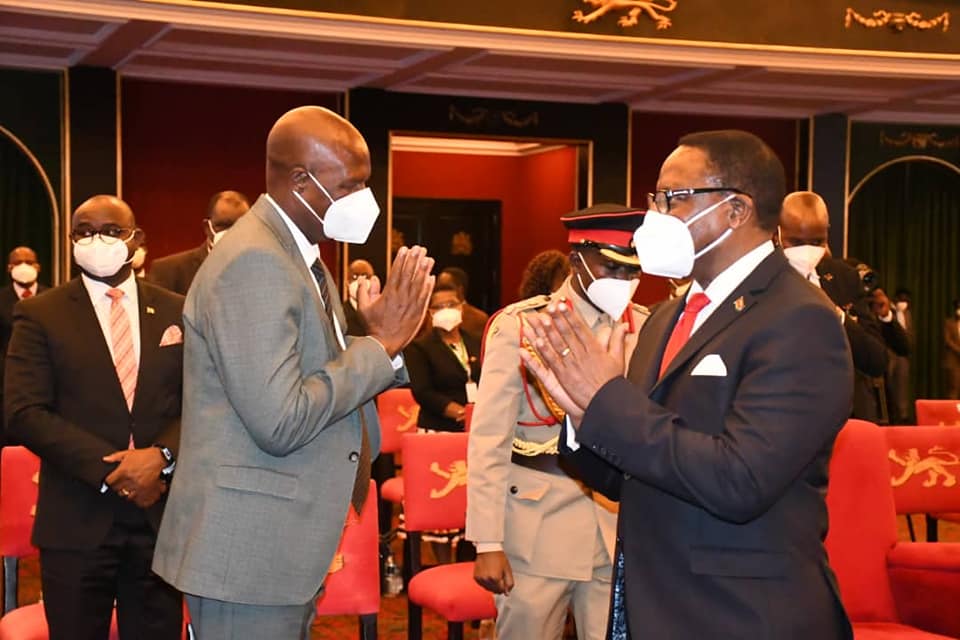Crop inspection report projects bumper yield
A crop inspection report that Minister of Agriculture Lobin Lowe presented to President Lazarus Chakwera has projected a bumper yield, lending credence to the Affordable Inputs Programme (AIP) which some critics questioned at inception.
AIP initially faced scepticism from some quarters who cautioned that the K160 billion investment would go down the drain if rains failed in a country that survives on rain-fed agriculture.

But the ministry’s progress report presented at Kamuzu Palace in Lilongwe on Tuesday indicates that most farming fields have good crops.
In his address after the presentation, in which the ministry beamed a video documentary depicting the status of crops across the country’s eight agriculture development divisions (ADDs), namely Karonga, Mzuzu, Kasungu, Lilongwe, Salima, Machinga, Blantyre and the Shire Valley, Chakwera said the report allowed him to hear directly from farmers across the country.
He said: “From what the farmers are saying, it is clear that they are not only happy with what they are witnessing in their fields, but the capacity it gives them to feed themselves three times a day and the opportunity they now have to sell the excess maize and have money in their pockets as seed for tomorrow.”
The President added that Malawians must be the judges on whether AIP has served them better, saying: “When it comes to measuring success of the programme, what matters is not the opinion of politicians, opinion of the Ministry of Agriculture, opinion of foreigners, political parties or the opinion of the President. When it comes to the success of this programme, what matters is the opinion of the farmer.”
In his speech earlier, Lowe hailed the Tonse Alliance administration for implementing AIP to enable registered smallholder farmers to access affordable inputs, with a 50 kilogramme (kg) bag of fertiliser at K4 495 while seeds were pegged at K2 000.
He said access to affordable farm inputs had been the missing part in the formula of sustainably ending hunger in the country.
Said Lowe: “Against all odds, you launched this programme in October last year. Being a man of action who doesn’t get carried away by the means to an end but rather the results, you commissioned the crop inspection tour to appreciate not only the outturn of AIP, but the general crop outlook to help plan for the consumption season ahead.
“My ministry embarked on this exercise across the country and successfully covered a representative area to discern the outturn of the season.”
The minister told Parliament at the start of Mid-Year Budget Review Meeting last month that government spent K140.2 billion on AIP from the initial K160.2 billion allocation in the K2.2 trillion 2020/21 National Budget.
He said the reduction in the cost followed the flushing out of ghost beneficiaries from the initial 4.2 million to 3.7 million farming households.
In the statement, Lowe projected the success rate at 91 percent.
AIP was rolled out as a successor to the Farm Input Subsidy Programme (Fisp) implemented by the previous Democratic Progressive Party (DPP) administration since 2006. Unlike Fisp which targeted an average one million beneficiaries at a cost of about K35 billion, AIP targeted four times the number. It also used the national identity cards.
By February 20 when the programme officially closed, 3.4 million farmers had redeemed their inputs against the targeted 3.7 million beneficiaries.
AIP initially faced resistance from some quarters who feared the multibillion kwacha investment would not achieve its intended purpose.
Agriculture expert Tamani Nkhono-Mvula is on record as having said spending such kind of money on a rain-fed programme was risky.
He said: “If there will be drought this coming rainy season all that money will go down the drain and the very beneficiaries will need food aid.”
Similarly, Consumers Association of Malawi executive director John Kapito asked government to postpone the programme saying it was a waste of resources that “Malawi can’t afford to bury under the ground”.





